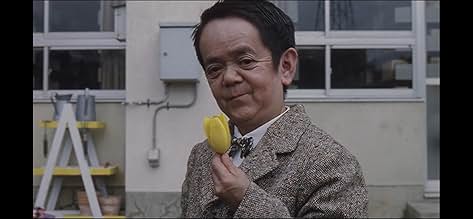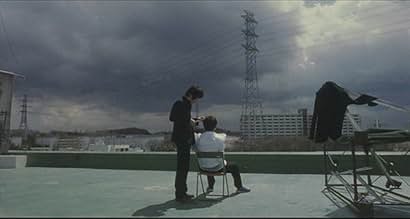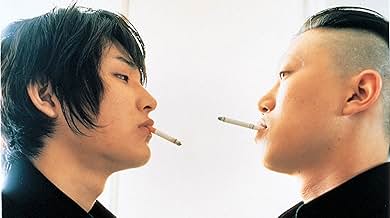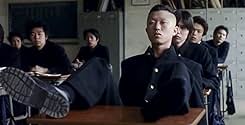Aoi haru
- 2001
- 1h 23min
VALUTAZIONE IMDb
7,2/10
4831
LA TUA VALUTAZIONE
Aggiungi una trama nella tua linguaA group of a run-down Tokyo high school students face the struggles of growing up, growing apart from their friends and worrying about their future, while living in a highly violent environm... Leggi tuttoA group of a run-down Tokyo high school students face the struggles of growing up, growing apart from their friends and worrying about their future, while living in a highly violent environment.A group of a run-down Tokyo high school students face the struggles of growing up, growing apart from their friends and worrying about their future, while living in a highly violent environment.
- Regia
- Sceneggiatura
- Star
- Premi
- 1 vittoria e 2 candidature totali
Yûsuke Ôshiba
- Kimura
- (as Yûsuke Ohshiba)
Eita Nagayama
- Obake (Ghost)
- (as Eita)
Recensioni in evidenza
With a Soundtrack from 'Thee Michelle Gun Elephant' that most English Indie Producers would kill for, and amazing cast and crew. Aoi Haru draws us into the lives of Japanese teenagers who aren't so lucky in life, who have to make their own destiny from the left over scraps of others who happen to throw them their way.
Aoi Haru is based in a public all boys school called Asahi High.
A extremely miserable place where teachers don't bother to encourage the boys to excel, gang graffiti tags are everywhere marking their turf, and the yakuza's frequently hang around outside the school trying to recruit young members.
The boys learn early on that if you don't fight for what is yours and what you want, then you better keep your mouth shut and stay out of the way. And even though these boys do act tough and dish out violence like a ice cube down the back of your shirt, the boys feel lost and confused due to the fact they cannot understand why they can not make their dreams come true. Almost feeling forced into the violence and self destruction they create because it will be their only real legacy they can leave behind before they enter the real world and pretty much dead end lives.
On the 25th Graduation ceremony at Asahi High a group of the new seniors head up to the Schools roof for a deadly tradition held by the boys who wish to rule the school. A initiation that involves the boys hanging off the side of the building and seeing how many claps they can do before they give up or just fall to their death when they can't grab the rail in time.
And this time Kujo wins the leadership, which does confuse the other boys abit because he is quiet and constantly deep in thought about things but accept it because he won fair and square.
Even though Kujo does seem to be harmless and gentle, when it comes down to it he can be the most violent member of his gang. Though Kujo is the leader of the gang and his Best friend Aoki adores him deeply, Kujo doesn't really want to change anything. He doesn't want to rip the school apart with violence unless he has to. He just feels lost about not knowing what the future holds and what is beyond High School, and constantly asks his friends what they will do after High School because he secretly doesn't know what to do himself. Which annoys Aoki greatly, because he has all of the power and he doesn't want to do anything with it. With this Aoki decides to break off and turn Asahi High into a living hell for everyone who is unlucky enough to get in his way, which in turn rips these Childhood friends apart.
But can they fix their friendship before it's too late?
In the end this Movie really is for all the Gofers, Wanna-bes, Dreamers and lost souls out there. Because everyone can relate to at least one of these characters in Aoi Haru
Aoi Haru is based in a public all boys school called Asahi High.
A extremely miserable place where teachers don't bother to encourage the boys to excel, gang graffiti tags are everywhere marking their turf, and the yakuza's frequently hang around outside the school trying to recruit young members.
The boys learn early on that if you don't fight for what is yours and what you want, then you better keep your mouth shut and stay out of the way. And even though these boys do act tough and dish out violence like a ice cube down the back of your shirt, the boys feel lost and confused due to the fact they cannot understand why they can not make their dreams come true. Almost feeling forced into the violence and self destruction they create because it will be their only real legacy they can leave behind before they enter the real world and pretty much dead end lives.
On the 25th Graduation ceremony at Asahi High a group of the new seniors head up to the Schools roof for a deadly tradition held by the boys who wish to rule the school. A initiation that involves the boys hanging off the side of the building and seeing how many claps they can do before they give up or just fall to their death when they can't grab the rail in time.
And this time Kujo wins the leadership, which does confuse the other boys abit because he is quiet and constantly deep in thought about things but accept it because he won fair and square.
Even though Kujo does seem to be harmless and gentle, when it comes down to it he can be the most violent member of his gang. Though Kujo is the leader of the gang and his Best friend Aoki adores him deeply, Kujo doesn't really want to change anything. He doesn't want to rip the school apart with violence unless he has to. He just feels lost about not knowing what the future holds and what is beyond High School, and constantly asks his friends what they will do after High School because he secretly doesn't know what to do himself. Which annoys Aoki greatly, because he has all of the power and he doesn't want to do anything with it. With this Aoki decides to break off and turn Asahi High into a living hell for everyone who is unlucky enough to get in his way, which in turn rips these Childhood friends apart.
But can they fix their friendship before it's too late?
In the end this Movie really is for all the Gofers, Wanna-bes, Dreamers and lost souls out there. Because everyone can relate to at least one of these characters in Aoi Haru
I'm told the title Aoi Haru can be read two ways: "blue spring" or "teenage years". Anyway, I liked this movie. What I liked were the dark aspects of this movie and the attempts at symbolism. What I didn't like was the somewhat aimlessness of the plot and the attempts at symbolism. I find it a lot like "go" which also has Hirofumi Arai (Aoki). Both violent highschool movies. Some people have compared it to Battle Royale... although I think this has a better basis in reality. Someone mentioned this movie was strung together from several short manga stories, which makes sense, since we tend to jump through several character's story lines. It isn't necessarily a bad thing, as we get to see where each character is coming from and where they end up. The variety is nice but it I felt like the movie lost it's focus at points. Overall, though, I felt it draws the viewer in and manages to stay kinetic throughout. There was rarely a boring moment. Even a girl waiting for her boyfriend ended up being very amusing. The movie is rather violent and disturbing at points, but managed to still be funny and introspective. I'd probably recommend it to people who can still remember what highschool was like.
If one pays scant attention to the news in Japan, seen Iwai Shunji's _All About Lily Chou Chou_, or read short stories and novels by Murakami Ryu, one knows that Japan, like other countries, suffers from an escalation of violence in schools. This violence works in three ways: student vs. teacher, teacher vs. student, and, the most common, student vs. student. Although it is still rare, the newspapers and news programs are peppered with stories of bullies beating someone to death or the bullied killing his bullies. Murakami Ryu and Yu Miri have both focused on these subjects in their literary works. Toyoda Toshiaki, through his film _Blue Spring_ also touches on this controversial subject.
The kids attending the all boys Asahi High School would basically be considered the dregs of Japanese society. The school is rundown and the teachers teach such a drypan, apathetic manner that it is not surprising that the kids could care less. The only teacher who seems to actually care about any of his students is a dwarf who waters the flowers on the school grounds all day.
However, although the teaching might be unstructured, there is a rigid code of hierarchy enforced by the tough kids. A leader is chosen by a suicidal ritual in which a student claps his hands as many times as possible while falling backwards. After he claps a certain amount of times, he grabs the guardrail. Miss the guardrail, instant pancake.
At the beginning of this film, after the "graduation" of the senior class, Kujo, played by the extraordinarily handsome Matsuda Ryuhei, wins the contest. Kujo is a bit indifferent to his new found power, but goes along with it because he has the support of his friends: Aoki, Yukio, Yoshimura, and Kimura.
Although many of the students are not satisfied with the way their lives are shaping, they seem to basically concede that good jobs and college are not in their future and that they are either on the track to become either a menial laborer or a member of the Yakuza.
_Blue Spring_ is an interesting film that depicts individuals who are not on the "normal road of becoming a good Japanese citizen": i.e. Graduation, work, stable family. It shows the dregs, but the dregs also show that social hierarchy exists from the lowest to the highest.
I think that the film is quite well done. The filming is dark, but it fits the atmosphere of the film. The soundtrack is excellent.
The kids attending the all boys Asahi High School would basically be considered the dregs of Japanese society. The school is rundown and the teachers teach such a drypan, apathetic manner that it is not surprising that the kids could care less. The only teacher who seems to actually care about any of his students is a dwarf who waters the flowers on the school grounds all day.
However, although the teaching might be unstructured, there is a rigid code of hierarchy enforced by the tough kids. A leader is chosen by a suicidal ritual in which a student claps his hands as many times as possible while falling backwards. After he claps a certain amount of times, he grabs the guardrail. Miss the guardrail, instant pancake.
At the beginning of this film, after the "graduation" of the senior class, Kujo, played by the extraordinarily handsome Matsuda Ryuhei, wins the contest. Kujo is a bit indifferent to his new found power, but goes along with it because he has the support of his friends: Aoki, Yukio, Yoshimura, and Kimura.
Although many of the students are not satisfied with the way their lives are shaping, they seem to basically concede that good jobs and college are not in their future and that they are either on the track to become either a menial laborer or a member of the Yakuza.
_Blue Spring_ is an interesting film that depicts individuals who are not on the "normal road of becoming a good Japanese citizen": i.e. Graduation, work, stable family. It shows the dregs, but the dregs also show that social hierarchy exists from the lowest to the highest.
I think that the film is quite well done. The filming is dark, but it fits the atmosphere of the film. The soundtrack is excellent.
'Aoi Haru' is a very bleak movie that derives its beauty precisely from the haunting sense of nihilism. The almost ruined school with its dingy rooms and dense graffiti is not just the set to the action, it seems to represent the characters' lack of prospects. A movie that makes something of a pun on the word 'adolescence' (together the kanji for 'ao' and 'haru' read as 'adolescence') cannot help but make considerations about the future but these are without a doubt not promising. The school-ground is a yakuza recruiting ground in the most literal of ways and the initiation into gangs is not so much a temporary revolt from troubled teens as it is a preparation for a life of crime. Dreams are hinted at only to be thoroughly dashed. Violence runs rampant but is handled soberly by a camera that know just how much to show to elicit a reaction.
It is against this background that the main story unfolds: a friendship between two boys gone wrong. Matsuda (Kujo) gives a stunning performance, his cool demeanor matches sociopathic tendencies very well and make him believable as a ruthless and detached young man with little interest even in his own life. The clapping game will have anyone hold their breath and is shot in such a way as to make it even more disturbing. Arai (Hirofumi) is also very competent as the bosom body whose fall out seals his descent into darkness.
A strong soundtrack adds to the impression of things going wrong in an artistic way. Juvenile delinquents or not the human aspect of boys in a sticky situation provides reasons for the viewer to see past the almost intrinsic seediness of it all. Ryuhei cutting Araki's hair as they discuss what to do when they grow up is surprisingly moving and the climax of the movie brings it all home in a painful but excellent way. Apart from these two leads there are minor characters that are equally interesting such as the sickly boy fascinated with worms (that despite being so peaceful frightens Kujo because he has a purpose), a psychopath in the making, the boy that wants to go to Koshien. All people that are adrift without guidelines.
Grownups are not absent but they appear sparingly and only the little person teacher that teaches the boys how to water flowers is a positive influence. The focus is strongly placed on the young actors and they truly do shine.
'Aoi Haru' is realistic despite being a very artistic movie. It should be seen back to back to Miike's 'Crows Zero' that is a take of the same concept in a much more fanciful and less bleak way. But 'Aoi' is brilliant in its own right by adhering so steadily to an ethos of bleakness and loss. Growing is, without a doubt, not easy.
It is against this background that the main story unfolds: a friendship between two boys gone wrong. Matsuda (Kujo) gives a stunning performance, his cool demeanor matches sociopathic tendencies very well and make him believable as a ruthless and detached young man with little interest even in his own life. The clapping game will have anyone hold their breath and is shot in such a way as to make it even more disturbing. Arai (Hirofumi) is also very competent as the bosom body whose fall out seals his descent into darkness.
A strong soundtrack adds to the impression of things going wrong in an artistic way. Juvenile delinquents or not the human aspect of boys in a sticky situation provides reasons for the viewer to see past the almost intrinsic seediness of it all. Ryuhei cutting Araki's hair as they discuss what to do when they grow up is surprisingly moving and the climax of the movie brings it all home in a painful but excellent way. Apart from these two leads there are minor characters that are equally interesting such as the sickly boy fascinated with worms (that despite being so peaceful frightens Kujo because he has a purpose), a psychopath in the making, the boy that wants to go to Koshien. All people that are adrift without guidelines.
Grownups are not absent but they appear sparingly and only the little person teacher that teaches the boys how to water flowers is a positive influence. The focus is strongly placed on the young actors and they truly do shine.
'Aoi Haru' is realistic despite being a very artistic movie. It should be seen back to back to Miike's 'Crows Zero' that is a take of the same concept in a much more fanciful and less bleak way. But 'Aoi' is brilliant in its own right by adhering so steadily to an ethos of bleakness and loss. Growing is, without a doubt, not easy.
so i decided to get around to watching this after seeing a pretty screencap from the film and googling it, reading a synopsis that sounded interesting and finding out that it had a cult following among both western and Japanese fans. i've viewed the film and *gasp* dear god my opinion is blasphemous--i really wasn't a fan. I was surprised to only see one other negative user review thinking it was my fault but nah not really. FIRST, i enjoyed the cinematography, acting and score. the j-alt/punk rock soundtrack was amazing utilized, not a lot of diversity but it was as rattly and raw as what was unfolding on the screen so props for that. the acting was also nothing crazy but the nihilistic tones of the film were conveyed very well with sincere acting that depicted withdrawn yet oddly human characters. the imagery and overall cinematography was quite beautiful, and visually it was pleasant to watch; special mention to the sakura porn that popped up every once in a while because those were especially beautiful but thats just my inner weeb talking. BUT i really wasn't a fan of the actual characters and plot. i thought they were icy--and i'm not talking reserved icy--i mean detached, disconnected and barely relatable. so as the events were unfolding throughout the film, i didn't really care to keep up with the people at the centre of the conflicts. i also didn't like the plot as it was vague with seemingly random events at times. i've seen other reviews defending the film saying its a fascinating take on disillusioned teenage Japanese boys a-la battle royale and how they struggle to find their meaning as adults blah blah blah. i'm not going to argue against that, i've just seen similar ground covered in related works that make this film look weak and barely pointed. if anyone's seen suicide club, i think that touched on similar themes but really drove the meaning home. in terms of trying to find one's place, NANA & a bunch of other manga series make a much greater effort and execute their message effectively. i didn't see that in this film, and a bit of metaphor and musing from characters for 5 minutes max definitely doesn't interest me towards the whole coming-of-age story its trying to push. maybe i don't get it, maybe if i was Japanese it would make more sense but i've enjoyed works in a similar vein and found little to love with blue spring (aoi haru)
Lo sapevi?
- QuizIn the scene where Kimura gives his blazer to the baseball club freshman before climbing over the fence to join the Yakuza, there is Japanese writing embroidered on the jacket lining. This is the same poem that Kimura reads out in voiceover during the subsequent shots of him getting in the car.
- ConnessioniVersion of Revolver - Aoi haru (2003)
- Colonne sonoreDrop
Performed by Thee Michelle Gun Elephant
I più visti
Accedi per valutare e creare un elenco di titoli salvati per ottenere consigli personalizzati
- How long is Blue Spring?Powered by Alexa
Dettagli
Botteghino
- Budget
- 800.000 USD (previsto)
- Tempo di esecuzione
- 1h 23min(83 min)
- Colore
- Proporzioni
- 1.85 : 1
Contribuisci a questa pagina
Suggerisci una modifica o aggiungi i contenuti mancanti






















